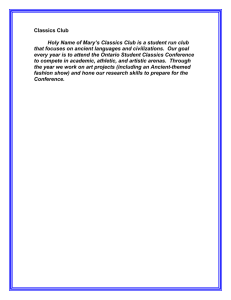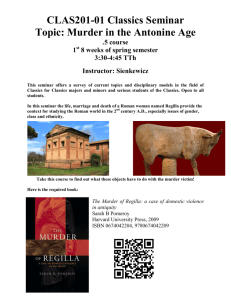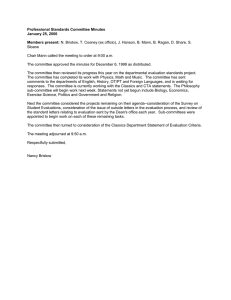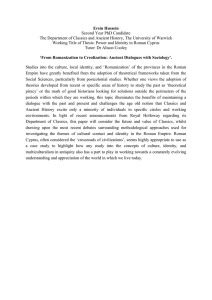REVIEW OF THE DEPARTMENT OF CLASSICS FINAL REPORT
advertisement
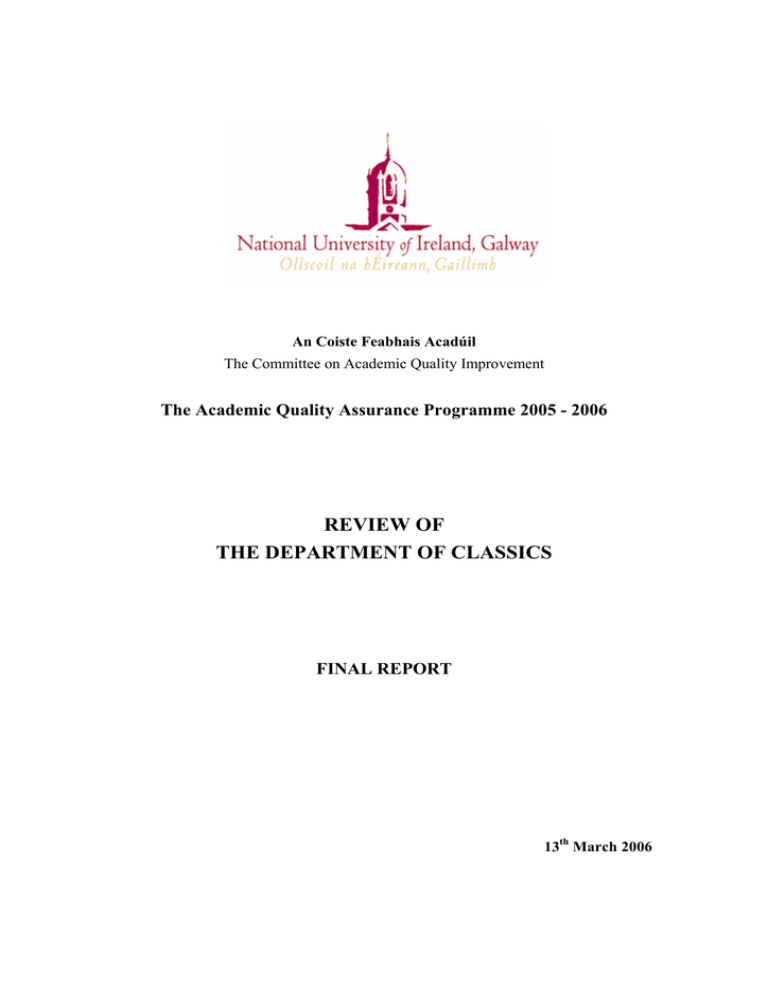
An Coiste Feabhais Acadúil The Committee on Academic Quality Improvement The Academic Quality Assurance Programme 2005 - 2006 REVIEW OF THE DEPARTMENT OF CLASSICS FINAL REPORT 13th March 2006 Department of Classics: Review Report 2005–06 2 Introduction This report arises from a visit by a Review Team to the Department of Classics from 1st – 3rd February, 2006. The Department had already prepared and submitted a 'Self Assessment Report' that, with other documentation, was made available to the Review Team in advance of the visit. The Review Team consisted of: Professor Christopher J Smith, School of Classics, University of St Andrews (Chair); Professor Andrew Smith, Department of Classics, University College Dublin; Professor Tadhg Foley, Department of English, NUI Galway; and Dr Kathryn Moore, Department of Earth and Ocean Sciences, NUI Galway, acting as Rapporteur. The report is structured to cover the following main topics: 1. Aims and Objectives 2. 3. 4. 5. 6. 7. Organization and Management Programmes and Instruction Scholarship and Research Community Service The Wider Context Summary and Concluding Remarks Classics is recognised as a core discipline in the University. The following are examples of its contributions: • Contribution of the Classical Civilisation programme to undergraduates in the Arts Faculty; • Significant contribution of the ancient languages to postgraduate research training; • High quality, internationally recognised research. The Department faces a period of rapid change and difficulty in terms of staffing levels in an environment of Faculty restructuring. Despite the current short-term uncertainty, the Department chose to engage with the process of review. We sincerely hope that the Review Group is able to contribute to its thinking about the future. 1. Aims and Objectives The Review Team appreciates the hard work and commitment that the Department of Classics has shown in preparing an extensive and comprehensive self-assessment report. The aims of the Department are clearly and coherently stated in the report. The self-assessment report is an important interim statement and the Review Group would like to encourage the Department to continue to think about its aims and objectives with greater focus on operational reality. A strategic planning process would enable the Department to consider its aims in terms of the local infrastructure, with greater recognition of the place of the File name, Print date Classics Final Report 05/07/2007 Department of Classics: Review Report 2005–06 3 Department within the Faculty. It needs to exploit the position that it already holds and develop it in the context of its own future staffing, and the research directions and trajectory of the institution. The objectives should be clearly stated, in order of priority, date of completion, and locus of responsibility. The self-assessment is heavily focussed on the Department of Classics as an independent unit and on a limited kind of staffing model aimed primarily at covering a wide spread of subject areas within the discipline. Whilst this is important, in the near-future the Department will need to consider more actively its role in the Faculty and more innovative solutions to its staffing model. Many of the suggestions contained later in this report will centre on this aspect. A strategic plan involving staffing levels could include the advance replacement for retirements in the wider context of planning for research and resources, to enable a smooth transition and continuity of expertise during a time of change. Simultaneous appointment would also be advantageous in terms of planning subject integrity and language cover. This is particularly important in any possible development of larger academic units. 2. Organisation and Management The Review Team acknowledges the commendable work of the Department in maintaining the integrity of the discipline in a warm and friendly atmosphere since the last review. It is natural for a Department of four academic staff to work in an informal environment. However, it has been noted that the Head of Department carries the majority of administrative responsibilities, leading to concerns over longterm operational sustainability. The duties of the Departmental staff are clearly understood and well executed but not equitably distributed. The current Departmental staff recognise this as something that will need to be addressed. The mode and style of management is not periodically evaluated and improved, and this should be made routine and formalised when the new Chair is appointed. The Review Team recommends that the management structure be reviewed specifically in terms of its sustainability. There is student feedback above and beyond the standard measures, with questionnaires introduced by the Department after the last review: students have open access to academic staff and feedback is acted upon. Information on course structure and organisation is available to students both as information in lectures and informally. But the Review Team recommends that information be systematised and streamlined for students and staff. Course templates could ease the burden of administration, particularly for new staff. There are two staff meetings each semester and another examination meeting at the end of the academic year, though academic staff are in contact on a daily basis. Minutes are now taken at Departmental meetings, as a consequence of the findings of the previous Review. But staff meetings are concerned with operational matters, rather than strategic planning, and are reactive rather than proactive. There is no representation of tutors at staff meetings, even though tutors play a large role in the teaching of the Department. All academic staff, tutors, postgraduates, and undergraduates bemoaned the lack of a full-time administrator, which inevitably imposes a greater administrative load on the File name, Print date Classics Final Report 05/07/2007 Department of Classics: Review Report 2005–06 4 Head of Department and other academic staff. An administrator would also be able to manage the Departmental accounts and examination mark collation, providing the Head of Department with time for strategic planning as well as relieving academic staff of the burden of dealing with routine student enquiries for half of the working week. The Review Team recommends that the University should consider provision of a fulltime administrator to the Department. The spatial organisation of the Department is not ideal. Postgraduates heavily involved in tutoring, vital to the effective teaching of Classics undergraduate students, are located in a separate building. Core research materials are locked in three different rooms and are not readily accessible. Computers for postgraduate students engaged in the Masters programme are located in the undergraduate tutorial room, used heavily for the latter purpose. The pressure on space thus restricts the ability of the Department to provide adequate access to literature and computers, and to support its increasing postgraduate community. The geographical spread of Masters and PhD students, and staff militates against the development of a more extensive research culture. The Review Team recommends that the Department engage in a review of the space requirements for maximizing the co-operative effectiveness of its complex activities. The quality of the furnishings in staff offices is outmoded: drawers are broken and chairs are basic. The Review Team recommends that the Department consult with the Buildings Office regarding the refurbishment of offices. 3. Programmes and Instruction The Department provides excellently taught, wide-ranging programmes that enthuse and engage students and has, since the last review, provided tutorials that are highly valued by students who felt that they gave direction and significantly aided understanding. Students also greatly appreciate staff feedback, particularly regarding examination performance. The individual members of the Departmental staff are very accommodating in serving student needs for academic advice and guidance. The reliability and cooperation of the Department in provision of courses, for example to overseas visiting students, has been noted. Mature and non-traditional students are very well represented and feel well supported. The results of student feedback questionnaires are circulated among all academic staff and acted upon, though more formal consideration could be made of feedback at staff meetings. Courses are regularly reviewed at modular, rather than at degree level, perhaps because the fundamental aims and objectives of the Department have not yet been formalised. Students and the external examiner appreciate the diversity of assessment procedures employed by the Department, including the oral examination. Some students expressed some dissatisfaction that a degree in Classics could be obtained without ever seeing a Classical site. The Review Team recommends that the Department consult with the Quality Office, in order to investigate the viability of pilot fieldtrips. The Latin and Greek languages are recognised by both Faculty and University Management, as well as students, as fundamental to the core activities of the Arts Faculty. In addition to Irish students registered for undergraduate and Masters courses in Classics, ancient languages are taught by members of the Department to visiting American undergraduates and postgraduates registered to other Departments File name, Print date Classics Final Report 05/07/2007 Department of Classics: Review Report 2005–06 5 in the Arts Faculty. Careful consideration should be made to correct and complete FTE accounting for this activity. The Review Team has identified that teaching provision of the ancient languages is a potential growth area for the Department; that language teaching is a means of facilitating research across the University; that language provision could be further and more-widely developed in the context of options and specialisation; and therefore recommends that the Department formalize the issue of credit for language teaching. An expansion of language teaching provision would require strategic planning in terms of staffing as well as course structure. The Classical Civilization curriculum has a similar structure in the second and third years in order to cover the great breadth of topics that are currently compulsory. Students feel that the present course structure and direction is excellent but would like the opportunity to take options. The provision of options (including languages) could facilitate greater specialisation at a relatively advanced level in preferred areas and could be combined with the provision of additional transferable skills and a wider range of assessment methods, including a dissertation. Such developments might be accommodated within the framework of a four year degree programme now being considered by the Faculty of Arts. The Review Team recommends that the Department investigate the possibility of providing optional courses within the undergraduate programme and consider the resource requirements that would be needed for such an endeavour. The possibility of establishing a diploma is viewed as a worthy, indeed excellent, development. New facilities in the University have the potential to facilitate exciting developments in the Department. For example, consultation with the learning technologist with responsibility for languages within CELT would help to establish the technologies that are most suitable for application to Classics. Students have also suggested that images could be more available online. The digitisation of an image database would significantly enhance the Department’s teaching resources, and may be facilitated by consultation with CELT and the Quality Office. The Review Group feels that the Department could be more ambitious in its requests for resource provision and technological assistance from the University and therefore recommends greater liaison with service units, in particular CELT and the Library. There could also be greater liaison between the Classics Department and the Careers Service. In particular students should be made more explicitly aware of the transferable skills that they obtain through the completion of a Classics degree (these include computer literacy and oral presentation skills) which would empower them in the job market. 4. Scholarship and Research There is a culture of scholarship and learning in the Department which has a positive influence on teaching. For example, postgraduate tutors use research to illustrate case studies to undergraduates and staff research interests are often reflected in undergraduate and postgraduate courses. Individual research is of a high quality and is internationally recognised. Individual scholars within the Department seem to find that they can conduct research under the present conditions and by making use of inter-library loans and visits to libraries in Dublin and abroad. New staff are File name, Print date Classics Final Report 05/07/2007 Department of Classics: Review Report 2005–06 6 encouraged and on target for productive research. The Review Team recommends that the new Head of Department strategically plan research to accommodate both the individual and the Department, with regard to its central position within the Arts Faculty, and involving external contributions. The research plan should include strategic research directions for the new Department, the balance of research directions in terms of replacement appointments and strategic Library enhancement through the Library resource allocation for new staff and Faculty of Arts discretionary funds. The existing strengths within the Library are primarily focussed on literature, but consultation with the Library regarding research collections may facilitate the Department’s ambitions in terms of its resources. Research strengths within the Department and the Faculty at large that may be future strengths include Literature, Reception and Text Editing. But a greater engagement with the Research Office will inform the members of the Department of the opportunities available for funding and collaboration. Discussion with academics from other Irish institutions would also help to establish collaborative research and funding opportunities, and also the areas in which the Department might occupy a national niche. The Department of Classics has an identity as a discrete and independent unit although it has and does make important contributions to the research activities of at least six other Departments, right across the Arts Faculty (for example, the provision of Latin for postgraduate students). Such research connections are presently informal and have not resulted in any significant formal or financial recognition for the Department of Classics. In the present academic environment of promotion of larger academic units, such research activities should be formalised and the provision of ancient languages is likely to be a key area in the future development of the Faculty of Arts, particularly if Graduate Schools are developed in Ireland. In the light of recent trends in funding allocation, the Department should investigate the opportunities that may exist for research collaborations with other Departments in the Arts Faculty. It is essential that the integrity and internal dynamism of core Classics activities be maintained at both undergraduate and postgraduate level while collaboration is simultaneously developed with other disciplines. 5. Community Service There have been substantial contributions to the academic community in intellectual terms by individual members of the department. Participation in national bodies include: the Classical Association of Ireland, the Irish Institute of Hellenic Studies at Athens, the National Committee of Greek and Latin Studies of the Royal Irish Academy. The team noted the continuing high visibility of the Department in important summer schools, international conferences and public occasions in support of classics. The attention given to attracting and retaining non-traditional students is commendable, both at undergraduate and postgraduate level. However, the disappearance of Classics from the school curriculum is a cause for concern in attracting school-leavers. The Department might give consideration to how it can assist in raising the profile of Classics within the existing curriculum and any areas in which it can provide guidance and support to schoolteachers. File name, Print date Classics Final Report 05/07/2007 7 Department of Classics: Review Report 2005–06 6. The Wider Context An immediate staffing crisis exists in the short term but the long-term necessity and sustainability of the Department of Classics is clear and needs strategic planning. The University wants Classics at the heart of the Faculty of Arts and the Department needs to respond positively on its part. In the immediate future only one of the complement of staff is assured within the next five-year period. The state of the department is that the Chair is vacant, a professor sustaining the language teaching of the Department is to retire imminently, another long-serving professor with an international reputation will be retiring shortly thereafter and one member of the staff is a contract appointment. It is apparent to the Review Team that the University Management recognises the need for a stable, permanent complement of staff to deliver the current range of courses offered by the Department, including the ancient languages. It would be advantageous for the University to make advance replacement appointments for these impending retirements to secure a viable platform for the maintenance and strategic development of research. 7. Report Summary and Recommendations The activities of the Department are appreciated and admired, to an extraordinary degree, by the Review Team, all of the students it met and the representatives of the wider University community including senior management. The Department is entering an exciting phase of potential development and expansion. A large number of recommendations have been proposed by the Review Team, focussing on strategic planning for staffing, research, and curriculum development. We are confident that both the Department and the University are committed to defining and achieving a set of realistic goals. Recommendations The following recommendations are made by the Review Team: • A strategic staffing plan be developed, with reference to research and resources, fully supported by the Faculty and University • The Department be more explicit in seeing the Department centrally in the context of the Faculty and its strategic plan • The management structure be reviewed in terms of sustainability • Information for students be systematised and streamlined • The University should consider provision of a fulltime administrator • There should be a review of space for postgraduates, particularly tutors • Broken or inadequate equipment and furniture should be replaced • There should be consultation with CELT and the Quality Office to investigate the viability of a digitised image database and pilot fieldtrips • The issue of credit for language teaching should be formalised File name, Print date Classics Final Report 05/07/2007 8 Department of Classics: Review Report 2005–06 • Students should be made more formally aware of the transferable skills they obtain by completing a degree in Classics, and their consequent employability • The Department should work towards provision of optional courses and specialisation in the undergraduate programme • The Department should continue to develop graduate and postgraduate skills, particularly language skills • There should be greater liaison with service units in general, in particular CELT and the Library • There is a need to engage in strategic research planning involving external contributions and advice, as well as consultation with the Research Office Comments on The Methodology of the Review Process 1. Documentation available was appropriate both before and during the review. 2. The methodology of the review requires a very open engagement between the review team and the senior management of the University, which did indeed take place. 3. Quality assurance is somewhat light of touch in this methodology. 4. It will be important that the University and the Department find effective ways of keeping the student body informed as to the action plans, as well as results of the review. Professor Christopher J Smith (Chair) Professor Andrew Smith Professor Tadhg Foley Dr Kathryn Moore (Rapporteur) 13th March 2006 File name, Print date Classics Final Report 05/07/2007
